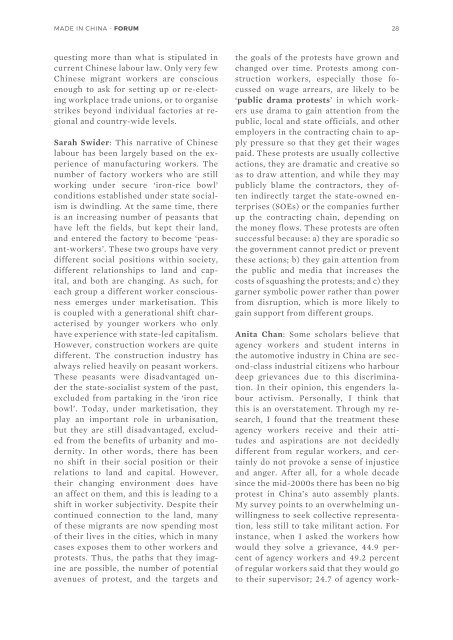MADE IN CHINA
MADE-IN-CHINA-ISSUE4
MADE-IN-CHINA-ISSUE4
Create successful ePaper yourself
Turn your PDF publications into a flip-book with our unique Google optimized e-Paper software.
<strong>MADE</strong> <strong>IN</strong> CH<strong>IN</strong>A - FORUM<br />
28<br />
questing more than what is stipulated in<br />
current Chinese labour law. Only very few<br />
Chinese migrant workers are conscious<br />
enough to ask for setting up or re-electing<br />
workplace trade unions, or to organise<br />
strikes beyond individual factories at regional<br />
and country-wide levels.<br />
Sarah Swider: This narrative of Chinese<br />
labour has been largely based on the experience<br />
of manufacturing workers. The<br />
number of factory workers who are still<br />
working under secure ‘iron-rice bowl’<br />
conditions established under state socialism<br />
is dwindling. At the same time, there<br />
is an increasing number of peasants that<br />
have left the fields, but kept their land,<br />
and entered the factory to become ‘peasant-workers’.<br />
These two groups have very<br />
different social positions within society,<br />
different relationships to land and capital,<br />
and both are changing. As such, for<br />
each group a different worker consciousness<br />
emerges under marketisation. This<br />
is coupled with a generational shift characterised<br />
by younger workers who only<br />
have experience with state-led capitalism.<br />
However, construction workers are quite<br />
different. The construction industry has<br />
always relied heavily on peasant workers.<br />
These peasants were disadvantaged under<br />
the state-socialist system of the past,<br />
excluded from partaking in the ‘iron rice<br />
bowl’. Today, under marketisation, they<br />
play an important role in urbanisation,<br />
but they are still disadvantaged, excluded<br />
from the benefits of urbanity and modernity.<br />
In other words, there has been<br />
no shift in their social position or their<br />
relations to land and capital. However,<br />
their changing environment does have<br />
an affect on them, and this is leading to a<br />
shift in worker subjectivity. Despite their<br />
continued connection to the land, many<br />
of these migrants are now spending most<br />
of their lives in the cities, which in many<br />
cases exposes them to other workers and<br />
protests. Thus, the paths that they imagine<br />
are possible, the number of potential<br />
avenues of protest, and the targets and<br />
the goals of the protests have grown and<br />
changed over time. Protests among construction<br />
workers, especially those focussed<br />
on wage arrears, are likely to be<br />
‘public drama protests’ in which workers<br />
use drama to gain attention from the<br />
public, local and state officials, and other<br />
employers in the contracting chain to apply<br />
pressure so that they get their wages<br />
paid. These protests are usually collective<br />
actions, they are dramatic and creative so<br />
as to draw attention, and while they may<br />
publicly blame the contractors, they often<br />
indirectly target the state-owned enterprises<br />
(SOEs) or the companies further<br />
up the contracting chain, depending on<br />
the money flows. These protests are often<br />
successful because: a) they are sporadic so<br />
the government cannot predict or prevent<br />
these actions; b) they gain attention from<br />
the public and media that increases the<br />
costs of squashing the protests; and c) they<br />
garner symbolic power rather than power<br />
from disruption, which is more likely to<br />
gain support from different groups.<br />
Anita Chan: Some scholars believe that<br />
agency workers and student interns in<br />
the automotive industry in China are second-class<br />
industrial citizens who harbour<br />
deep grievances due to this discrimination.<br />
In their opinion, this engenders labour<br />
activism. Personally, I think that<br />
this is an overstatement. Through my research,<br />
I found that the treatment these<br />
agency workers receive and their attitudes<br />
and aspirations are not decidedly<br />
different from regular workers, and certainly<br />
do not provoke a sense of injustice<br />
and anger. After all, for a whole decade<br />
since the mid-2000s there has been no big<br />
protest in China’s auto assembly plants.<br />
My survey points to an overwhelming unwillingness<br />
to seek collective representation,<br />
less still to take militant action. For<br />
instance, when I asked the workers how<br />
would they solve a grievance, 44.9 percent<br />
of agency workers and 49.2 percent<br />
of regular workers said that they would go<br />
to their supervisor; 24.7 of agency work-


